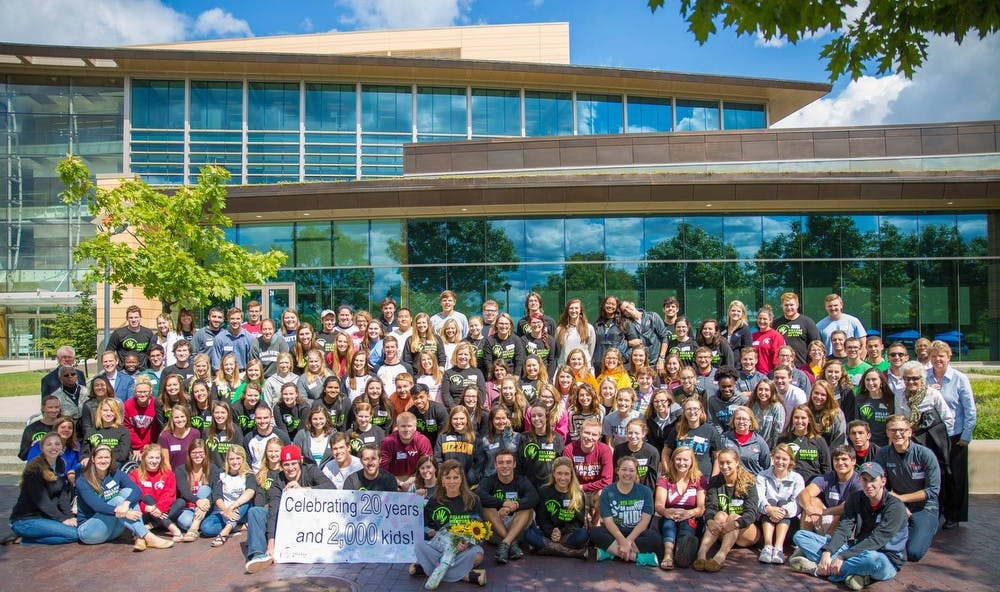It was a light bulb moment for ASU health professor Erin Feser. Walking across her college campus, juggling classes, jobs and internships during her sophomore tear of college, she realized something.
“I was doing a lot of stuff for me, but not doing anything for anyone else,” Feser said. “I feel like in college, your whole world just revolves around you, your class schedule, your internship and what you’re going to do with your life.”
It was that moment that brought Feser to dive headfirst in the organization, College Mentors for Kids, and that moment that would inevitably lead Feser to establish her own branch of the organization 10 years later.
College Mentors is an organization developed over the past 20 years that pairs college students with underprivileged kids in underfunded schools. The mentors work one-on-one with the students and show the kids the importance of dedication and helps them understand higher education opportunities.
“What we hope to achieve is to get these kids to believe in themselves,” kinesiology senior Kaitlin Wilson said. “A lot of them don’t realize they have it in them to do whatever they want to do. We’re trying to give them confidence boosters and everything they need.”
Wilson, the ASU chapter’s president, said she hopes to make an impact in the Tempe and Phoenix communities with the help of Feser.
There are 32 chapters of College Mentors across the U.S., and starting in February, ASU will become part of this list.
Feser worked with the organization for three years at Purdue University and fell in love with what she was doing there. She always told herself that she would begin a chapter at whichever university she later found herself in.
Fast forward ten years and Feser is working to establish the largest chapter start-up the organization has ever undertaken.
Their start-up year goal is to have 40 college students serving 40 elementary students on the Downtown Phoenix campus and 80 college students serving 80 elementary students in Tempe.
“When I was volunteering, there was a little buddy who asked his mentor for extra snacks so that he could take them home to his little brother because they often don’t get dinner. That was just like — whoa, that’s going on in our community?” Feser said.
It was that impact that she not only wanted to make on the elementary students, but also on the college students — opening their eyes to a different lifestyle than their own.
Enter Wilson, who heard Feser, her professor, talking about it in class and was intrigued. Wilson said she wanted to be a pediatric physical therapist after graduating and it was this sort of impact and interaction with children that she lived for.
“It’s such a great reward,” Wilson said. “You don’t get any money for it, you don’t get any praise for it, but it’s just seeing that light in those kids eyes and how excited and happy they are — how you’re making a difference.”
The plan for them is to pair each kid with a mentor and have them visit campus once a week. Through that visit, they will have an overarching theme or topic like science or community service.
The group transports the children to campus, gives them snacks, reads them books and does an activity connecting to the topic matter. Then, they have the kids write in journals about what they’re interested in and what they have been doing.
They break the kids up into groups of 10 so they cater to each child’s interest.
The organization itself has lasted more than 20 years and has paired more than 2,000 first-graders through sixth-graders with 2,300 college mentors.
Levester Johnson, vice president for student relations at Butler University, said the program is still growing, and has impacted each student involved uniquely. Butler was one of the 32 schools participating in College Mentors.
“As a person of color, I wasn't introduced to a college campus until my senior year of high school,” he said. “I almost missed out on the dream to attend college. I've been so touched by what I've seen through this program.”
While Feser said she hopes to have the success of any one of the colleges in the program, she also wants to also individualize it and localize it to ASU.
“One of the goals that the president always sets forth is for us to always be involved in our community, and this is us being directly, hands-on involved with our immediate community,” Feser said.
Related Links:
Students create mentoring program for foster children
Campus club 'sparks' children's college aspirations
Reach the reporter at megan.janetsky@asu.edu or follow @meganjanetsky on Twitter.
Like The State Press on Facebook and follow @statepress on Twitter.




